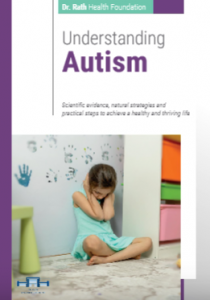- Have any questions? Contact us!
- info@dr-rath-foundation.org

Multibillion-Dollar Opioid Drug Maker Purdue Pharma Files For Bankruptcy Protection
September 12, 2019
Women Taking Paracetamol (Acetaminophen) In Pregnancy Risk Children Having Behavior Problems
September 13, 2019Understanding Autism: Scientific Evidence, Natural Strategies And Practical Steps For A Healthy Life

Autism spectrum disorder (ASD) is surrounded by numerous controversies and arguments amongst health professionals and parents alike. The controversies extend not only to treatment of the condition, but also to whether it should be considered a disorder in the first place. In a new brochure published by the Dr. Rath Health Foundation, Mirja Holtrop and Dr. Aleksandra Niedzwiecki examine the scientific evidence. Looking at natural strategies, they describe practical steps for patients diagnosed with autism to achieve a healthy and thriving life.
Autism spectrum disorders encompass a broad range of conditions characterized by few social skills, repetitive behavior, challenges in speech development, and nonverbal communication disabilities. Examples include Childhood Disintegrative Disorder (CDD), Pervasive Developmental Disorder – Not Otherwise Specified (PDD-NOS), and Asperger syndrome.
Many popular books on this topic teach parents how to train their child so that he or she can function better in social interactions. Mostly, however, these books do not elaborate on how to improve the underlying conditions. After digging into original research about the role of micronutrients in autism, Ms. Holtrop and Dr. Niedzwiecki have concluded that much robust science exists to support natural, safe and effective options that parents can use to help their affected children get better.
Natural remedies for autism spectrum disorders
Nutritional supplements are very important in autism as they provide key micronutrients to support specific metabolic pathways in the body’s cells. Supplements can also be taken in doses that are rarely achievable through diet alone. Significantly, therefore, research shows that micronutrients can have a profound impact on autistic symptoms.
Thus far, most studies involving micronutrients in autism have been conducted using individual nutrients. Consistent with the Cellular Medicine approach, however, the most pronounced and comprehensive health effects are achieved with multinutrient supplements that contain synergistically interacting natural ingredients. The key micronutrients for which scientific evidence exists for their role in autism include the following:
| Vitamin D: Maternal vitamin D deficiency may cause autism in newborns. It has been demonstrated that autistic behaviors disappear after high-dose vitamin D therapy. It has also been shown that Vitamin D deficiency during pregnancy may predispose children to autism. |
| Vitamin A: Autism may also relate to damage to G-alpha protein, a receptor protein in the retina. This protein is critical for language processing and attention. Scientific evidence suggests that natural vitamin A fixes this protein defect in autistic patients. |
| Glutamine: Serum levels of this amino acid are particularly low in patients with autism. Glutamine acts as a precursor of the neurotransmitters glutamate and GABA. It has been shown that glutamine helps to prevent leaky gut syndrome, a condition that is common in autism. Sometimes referred to as increased intestinal permeability, leaky gut syndrome is a disorder in which germs and toxins are able to pass through the intestinal wall. |
| Glutamate is a nonessential amino acid. It can’t cross the blood-brain barrier and must therefore be synthesized in neuronal cells from precursor amino acids. The most important neurotransmitter for normal brain function, glutamate is involved in learning and memory. Glutamate must be balanced with the neurotransmitters GABA and glutamine. Elevated levels of glutamate released during neuronal injury are toxic to neurons. Glutamate level abnormalities are considered a major mechanism behind autism. Patients with autism have high levels of glutamate which can lead to self-stimulatory behavior, seizures, and similar symptoms. |
| Folate: Many research data point to low folate levels in patients with autism. Folate supplementation can resolve symptoms of autism in some cases, particularly in patients with genetic changes that affect the function of folate-dependent enzymes. |
| Vitamin C lessens the severity of symptoms and improves sensory motor scores in patients with autism, possibly due to its interaction with dopamine synthesis. It also has strong sparing effects on levels of glutathione, an important antioxidant. Sufficient intake of vitamin C can result in decreased oxidative stress, improved cellular sulfation processes and enhanced bioenergy production in the cells. |
| Glutathione and cysteine: Evidence shows that autistic patients have significantly lower levels of the antioxidant amino acids glutathione and cysteine compared to healthy individuals. Low antioxidant status impairs detoxification and causes oxidative damage to the cells. This has been linked to autistic symptoms. Deficiencies of glutathione and cysteine impair methylation processes in cells and have been linked to neurological symptoms in autism. |
| Vitamin B1: A deficiency of this vitamin has been linked to delayed language development. Supplementation significantly benefits patients with autism. |
| Vitamin B12: Low levels of vitamin B12 impair the methylation process, which is important for detoxification in cells. Insufficient intake of vitamin B12 can cause neurological damage. Deficiency of vitamin B12 can cause optic neuropathy and vision loss in autistic patients. Vitamin B12 is also important for raising levels of glutathione and cysteine. |
| Vitamin B6 levels are low in many patients diagnosed with autism. When patients receive B6 supplements they exhibit better eye contact, improved speech and less self-stimulatory behaviors. Vitamin B6 in combination with magnesium is an efficient treatment for patients with autism. |
| Magnesium: This mineral is important for neurotransmitters responsible for social reactions and emotion. Patients with autism generally have low magnesium levels. Magnesium improves the efficiency of vitamin B6 therapy, so these two nutrients should be taken together. |
| Zinc binds mercury and removes it from brain tissue. Zinc and copper levels are often particularly reduced in autistic children. Low zinc levels impair metallothionein, a protein that helps to excrete heavy metals from the tissues. |
| Carnitine transports fatty acids into cells so they can be burned for bioenergy. Research shows that a low carnitine status is a common feature of autism and that it impairs the body’s ability to use fatty acids for learning and social development. |
| Omega-3 fatty acids: Scientific research suggests that children with autism have very low levels of omega-3 fatty acids. The omega-3 fatty acid Docosahexaenoic Acid (DHA) is a major component of every brain cell. Omega-3 fatty acids have strong anti-inflammatory properties. Look for vegan oil omega-3 capsules that are rich in DHA, or use fish oil capsules. The omega fatty acids of highest quality are ‘molecularly distilled’, which means they do not contain mercury. |
| Tyrosine aids dopamine production in brain cells. Low tyrosine levels can lead to dopamine deficiencies in the brain, which can result in mood disorders and autistic behavior. |
| Tryptophan is a natural amino acid that helps the body to produce serotonin, a neurotransmitter that has a calming effect. Scientific research clearly indicates that people with autism may have a damaged tryptophan metabolism, with decreased levels of this amino acid. This can affect brain development, neuroimmune activity and mitochondrial function. |
Scientific references supporting all of the above information can be found in the brochure. If you have any questions about this brochure and the topics discussed in it, please feel free to contact us.




